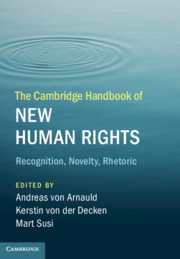Book contents
- The Cambridge Handbook of New Human Rights
- The Cambridge Handbook of New Human Rights
- Copyright page
- Contents
- Figures
- Contributors
- Acknowledgements
- Introduction
- Part I Cross-Cutting Observations
- Part II Public Good Rights
- Part III Status Rights
- Part IV New Technology Rights
- Part V Autonomy and Integrity Rights
- Part VI Governance Rights
- The Right to Democracy
- The Right to Good Administration
- The Right to Freedom from Corruption
- The Right of Access to Law
- 42 Bentham Redux
- 43 A Right of Access to Law – or Rather a Right of Legality and Legal Aid?
- Index
43 - A Right of Access to Law – or Rather a Right of Legality and Legal Aid?
from The Right of Access to Law
Published online by Cambridge University Press: 04 January 2020
- The Cambridge Handbook of New Human Rights
- The Cambridge Handbook of New Human Rights
- Copyright page
- Contents
- Figures
- Contributors
- Acknowledgements
- Introduction
- Part I Cross-Cutting Observations
- Part II Public Good Rights
- Part III Status Rights
- Part IV New Technology Rights
- Part V Autonomy and Integrity Rights
- Part VI Governance Rights
- The Right to Democracy
- The Right to Good Administration
- The Right to Freedom from Corruption
- The Right of Access to Law
- 42 Bentham Redux
- 43 A Right of Access to Law – or Rather a Right of Legality and Legal Aid?
- Index
Summary
Human rights evolve continuously. Sometimes entirely new rights spring up, for example in response to technological developments. Most ‘new’ human rights, however, are refinements of existing rights, which somehow have come to be regarded as deserving protection in their own right. An intriguing question is when such new (aspects of) rights deserve to be formally recognised or even codified in international treaties or national constitutions. In these comments I will try to answer this question for the right that Simon Rice suggests should be recognised: the right of access to law. I will focus on the added value of recognising such a right, rather than dealing with its theoretical foundations.
- Type
- Chapter
- Information
- The Cambridge Handbook of New Human RightsRecognition, Novelty, Rhetoric, pp. 555 - 562Publisher: Cambridge University PressPrint publication year: 2020

